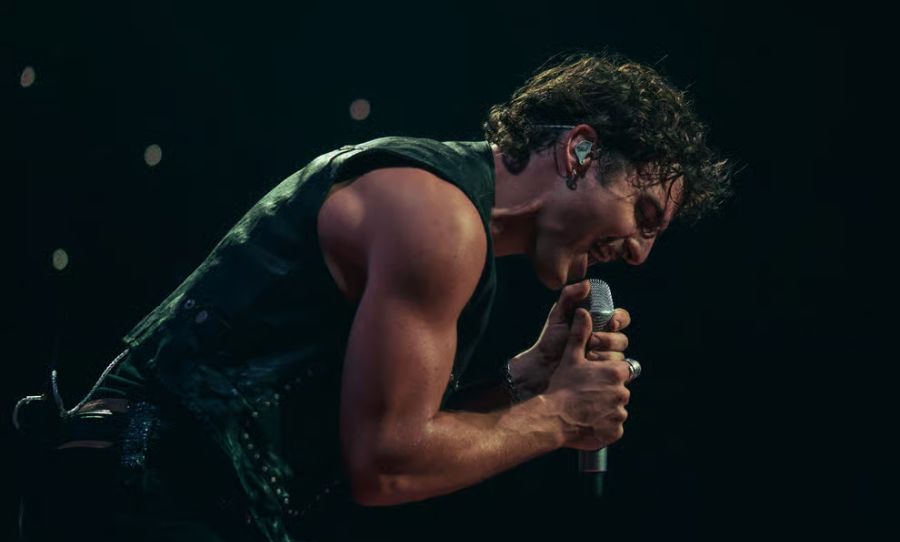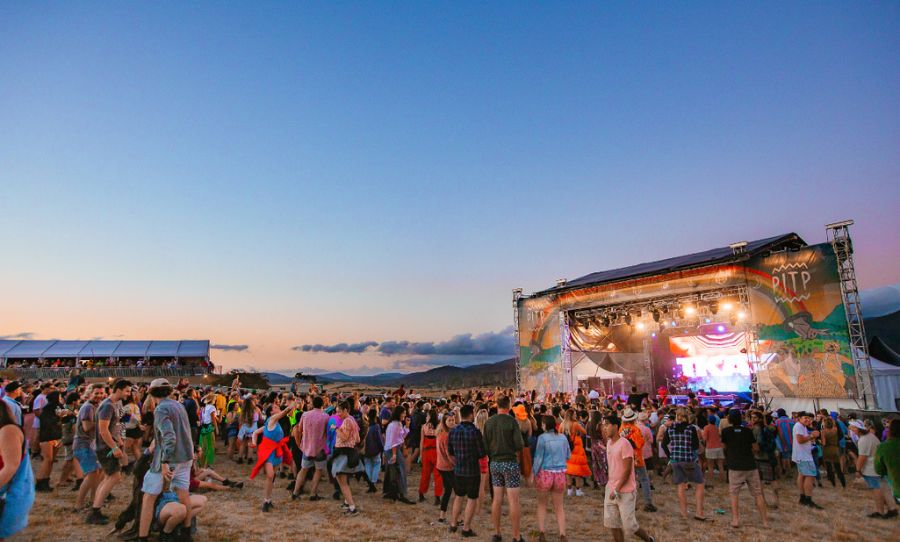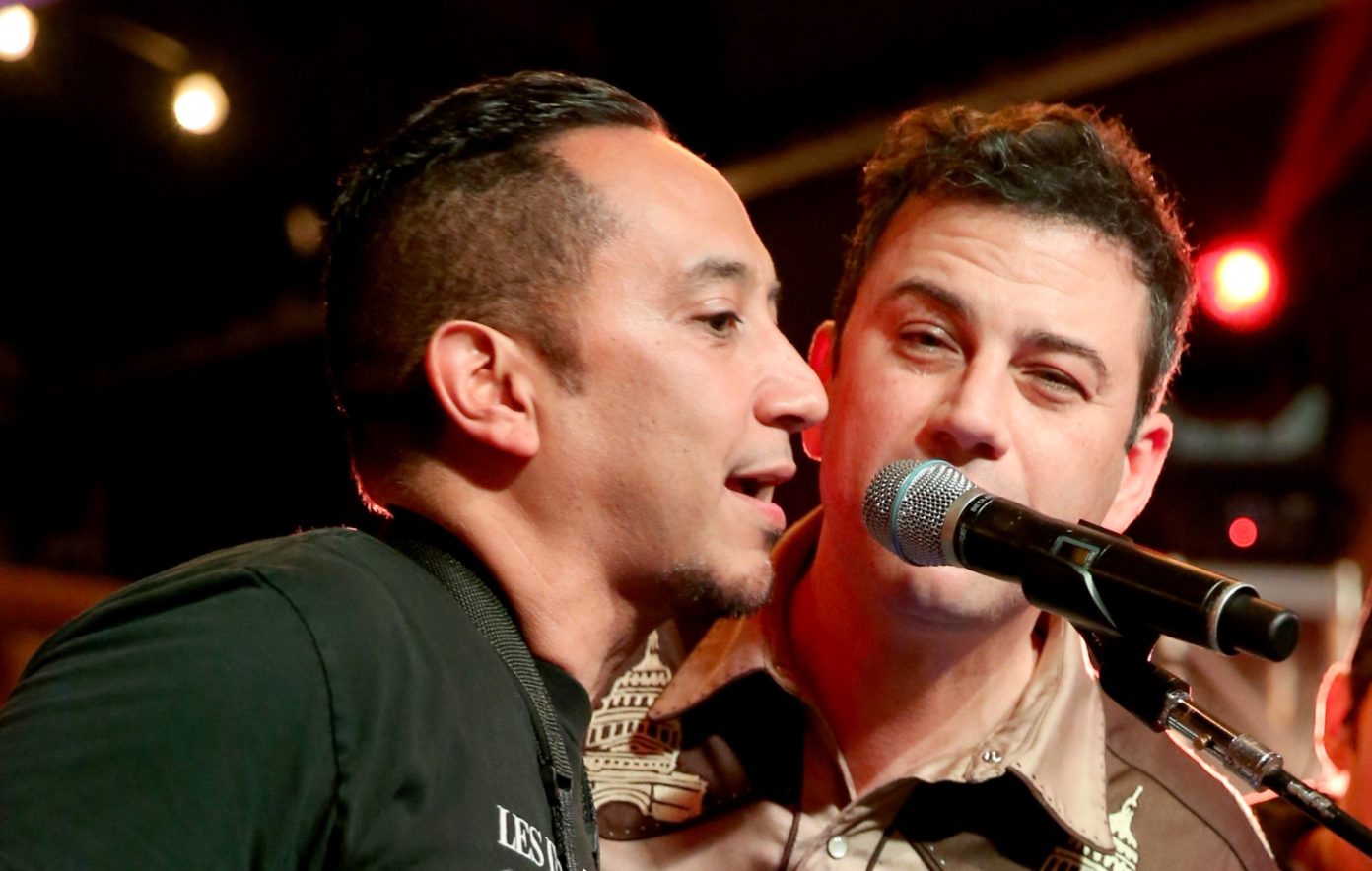Listening to Durand Jones & The Indications is a truly spiritual experience – a light at the end of the tunnel as the world seems to constantly flux between chaos, and terror.
However, this bright spark is only amplified further on their latest LP, Private Space, a unification of the soul-pop and funk psychedelia that the band – composed of singer Durand Jones, singer/drummer Aaron Frazer, guitarist Blake Rhein, keyboardist Steve Okonski, and bassist Michael Montgomery – has been busily refining for years.
In light of this breath-of fresh-air release, Happy got the chance to have a Zoom chat with Durand, Blake, and Aaron, to chat about grooving in global chaos, and The Indications of Durand Jones.
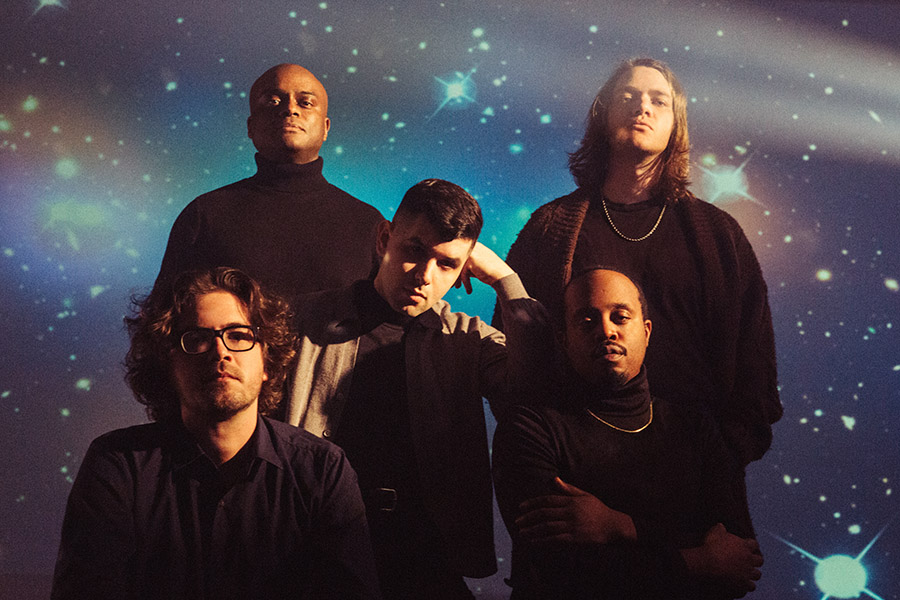
HAPPY: Brilliant. Let me get everything set up on my end. OK, fantastic. So, I guess I want to sort of get the agony-aunt out of the way and ask, how’s everything going COVID wise? Is everyone doing OK? I hear Delta’s having a moment.
BLAKE: Yeah, I mean, just doing our part, you know. Continuing to wear the mask and stuff. I mean, I wasn’t really going to a lot of like public gatherings, but I went to like one show, and I’m probably not going to do that again until the tour starts. So, yeah, just kind of treating it like I did back a year ago.
DURAND: Yeah, man, I’m from Louisiana and it has like one of the highest COVID rates right now, possibly in the world, I’m assuming, because it’s really dangerously bad. My brother’s got COVID right now, two of my nieces got COVID. A couple of my friends got COVID too. Thankfully, my brother’s fully vaccinated and my nieces don’t really have any symptoms. But my friends who have a little distrust with the government weren’t vaccinated, and they’ve been in the hospital and on ventilators and shit. So, it’s absolutely crazy to me. And I didn’t post myself with my card, but I think I need to just to like, inform people like, “Hey, yo, before I got the vaccination, more than eight weeks ago, I would have these symptoms like… get vaccinated and be safe, you know.”
HAPPY: Yeah, well, I was going to say, it sounds like someone… everyone kind of needs to, like, spread awareness that it’s not going to fuck you up royally. I can understand distrust for the government, but I’m definitely vaccinated, I just want to make that clear.
HAPPY: Same here.
HAPPY: Aaron, anything to report?
AARON: I’m in Brooklyn and, you know, most people are vaccinated here. But when you have a city that’s so densely populated, it’s usually, you know, amongst the first places to get hit hard. I haven’t really seen a ton of the Delta variant stuff happening here. But New York was very quick to institute vaccine requirements in all restaurants, you know, basically public spaces and commercial spaces. And, yeah, you know, the political polarisation is such that I don’t know that, you know, the government pushing for the vaccine, I don’t know that’s necessarily the wrong thing to do. But I think like to echo Durand’s sentiment, you know, it probably is on us and people who I think are… entities that are perceived as nonpartisan to say like, “It’s OK. Not only is it OK, but it’s important to get vaccinated.”
But I will say also, the more people in these unvaccinated areas see hospital beds filling up. I think in Mississippi, there were eight hospital beds as of last night that were open in the entire state. And I think that’s the type of thing that, unfortunately, it’s not real for so many people until it’s in your community, in your home, in your body. And that’s just it. Some people have to learn imperially.
HAPPY: Onto something a bit brighter… bubblier. I do want to talk about Private Space as this… it’s a really interesting case study, I think I found in the sense that, compared to like American Love Call, and I think given the fact that it’s a post-pandemic album, so many artists have come out with things that are a lot moodier or depressing, reflective of the times, whereas Private Space I think is lovelier. And I just sort of wonder why you went in that direction, especially given the fact that everyone is breaking away from that right now. I just think it’s interesting.
DURAND: I would go, well, if you listen to our discography, like the first and second album, we really had, a moderate cruising space type of vibe going. And for this one, we really wanted to challenge ourselves and push ourselves to see if we could do some up-tempo, more groovier things. When the pandemic happened, it just made it all the more reason to do so because we were just hoping that, you know, we would at least get to some kind of normal life again, in some kind of way or capacity. People could really vibe to this thing and really dance and groove and have a good time. You know, I think that’s what people are waiting to do still to this day is, you know, embrace and really dance, have a great time with their friends and family like they did, you know, pre-pandemic.
HAPPY: Yeah. I think it’s interesting, though, I don’t know, I guess like your take on soul… There’s just something about it, it’s different and I can’t quite put my finger on it. I guess it’s so immediately enjoyable. Does that make sense? I just sort of… I want to get inside maybe the technical aspect to it. Is there anything you guys did differently this time around?
AARON: I think that there are influences represented here, you know, more on the forefront in some ways than in previous records. Like our previous records, I think, especially American Love Call, I didn’t feel like that’s one hundred per cent retro soul. But I understand, you know, that being a quick way for people to, like, categorise it. But this one has, you know, like you said, there’s disco elements, there’s boogie elements, there’s pop elements and hip hop elements that were, I think, different hip hop elements. Like our previous records, I think the hip hop kind of manifests in the drums, in these kind of repeated phrases that, you know, Crate Diggers might pull out of an old record and sample. But here, I think the hip hop elements, especially on a track like Witchoo, ‘I want to go 85 with the…’ That cadence is not something you were going to hear in the 70s, even necessarily into the 80s. It’s very much just a contemporary approach to writing lyrics. And so, you bring something contemporary, but then keep some of the old school flavour as you, I feel like you pointed out, get something that not everyone’s doing. And also, it’s not completely old school. There’s something different.
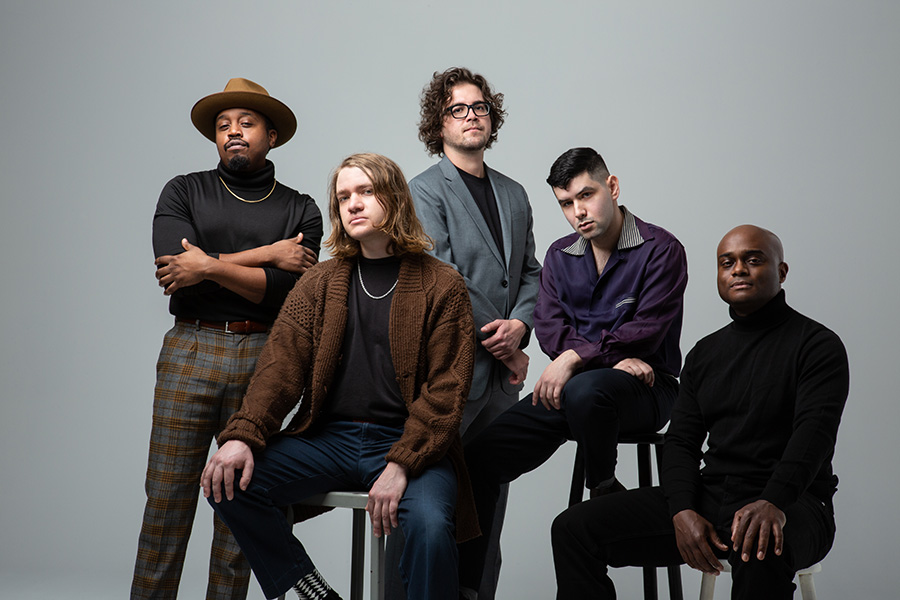
HAPPY: Yeah. Because I think that that’s a really interesting factor, and it’s like Roisin Murphy meets Earth, Wind and Fire. It’s definitely pushing something forward, but also harking back to what it’s trying to emblem. So, if you didn’t know, I think the album slaps. I played it like 400 times. So, I’m also sort of wondering about Sea of Love, just because it’s sort of stuck with me recently. I can’t get it out of my head. Can you maybe give me some more insight into what that song is about, how it all came together?
AARON: Blake you want to go?
DURAND: You go. Go ahead, you do it.
BLAKE: I mean, it was like one of the was one of the first songs we wrote for this record. It was definitely like one of the first that has a very distinct, like, disco feel to it. So, I think more than anything, we were really just like… when we did that demo, we hadn’t recorded together in a while. So it’s kind of like a combination of us just like getting our chops together, and getting together this disco production vibe. You know, there’s like certain elements of that song – you know, like just dropping out the bass drum or the snare drum, like in the measure before the chorus – that kind of gives it that like disco element, almost like a house element, where you’re pulling our rhythmic elements to elevate the songs. But then, you know, I think lyrically we kind of approached it in a very objective way. You know, you have this metaphor about the ocean or a sea and love, and just trying to write lyrics that kind of have a nice flow to them and work well.
HAPPY: I’m also intrigued. So I guess, did you have these sort of in the works while lockdown was happening? Was this sort of something that you were planning to do during the pandemic as well, or did they sort of all come about after everything sort of died down for a little while?
DURAND: We definitely had a plan on playing a third album out before the pandemic happened. I think that, you know, once we got quarantined that changed everything. Absolutely. And I’m kind of OK… I’m not OK with, you know, all the people that died, but I’m totally OK with us just having a little bit more time to work on this, because I really do feel like we got to work on 20 something songs. And got to pick what we felt collectively was the cream of the crop. And it would have worked out a little bit differently if we weren’t quarantined, if we weren’t in a pandemic, we would have been recording and demoing songs in between tours and shows, which adds a whole different level of difficulty, stress, and anxiety, which we didn’t have this time around, which was kind of nice.
HAPPY: Yeah. So I’m wondering, was this album informed by live performances at all, just because I saw some videos of you performing at the Bishop back in 2014?
AARON: I think that being in front of… The lack of an audience, for our first record, I think, is what led to that first record, having the sound that it had to me. It’s like, it’s slower. It’s really slow. And I think it’s part of like when you’re in a basement and you’re just like having a drink and maybe smoke with some friends, just like the tempo drops because it’s very relaxed. But after years of touring, we definitely have found what moves the crowd, what moves the hips, you know, and also a lot of times we DJ… not a lot of time. Sometimes we DJ after the show because we collect records. And that’s another way you get just like a very immediate sense of like, “OK, you drop the needle on this record and it feels good. And you can just see it hit the crowd, like a wave of energy, you know.” So it’s been fun to apply those lessons to this record. And so, yeah, to me, I do think that this album is a result of making music in front of people.
HAPPY: Yeah. I think that’s a really interesting way to look at it. And I’m sort of wondering in that case, like, was there anything that you all sort of had to push through, anything you found, particularly sort of like really fucking hard about it that ended up really just paying off as a result?
BLAKE: I don’t know, I mean, I think we have a really good team – not only just the three of us, but then Steve Okonski, our keyboard player, and Mike, our bass player, and then our string section who helps do some arrangements. We have such a good team. And we all play to each other’s strengths, everything kind of feels pretty fluid. And it doesn’t really feel like collectively we get like writer’s block. It seems like, if one person or two people have writer’s block, there’s one person that kind of like pushed through. Or if the song gets stuck, there’s one person that can kind of, you know, push it over the finish line. So, in terms of just like writing, you know, I think the hardest part for me actually was just culling down the total number of songs we had, because like I was saying earlier, we had written, you know, 20, maybe even 30 songs for this record. And then we had to kind of like pare it down to what we thought was the best.
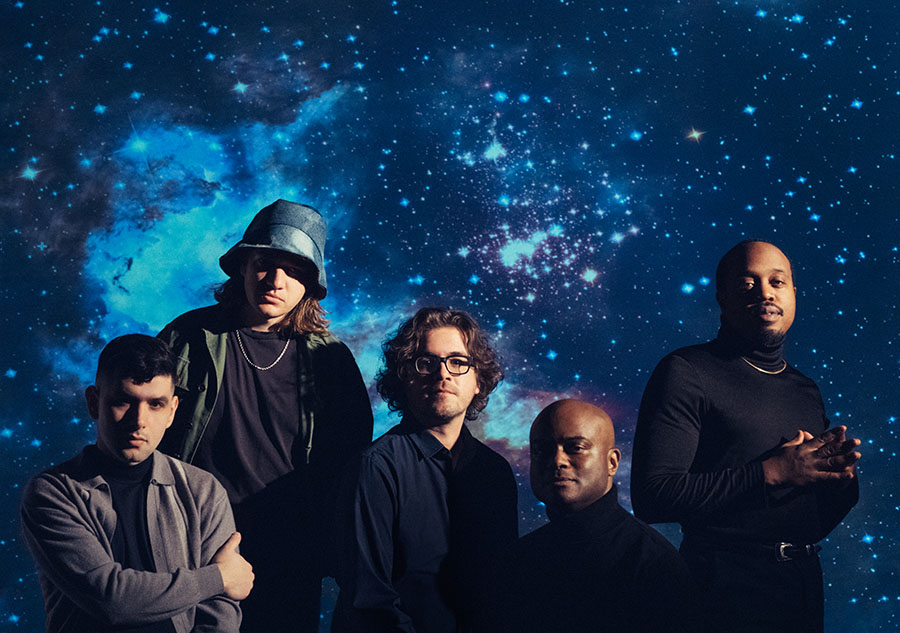
DURAND: For me personally, I totally agree the culling of the songs. To me, I think it didn’t wind up being like, what are our best? It’s more like what fit together, what was our cohesive set, you know? But also, I think the big challenge was just like to do this during COVID, we had to mask up. We took all the precautions very, very seriously. So to be in the studio… and we self-produced this record, so after every take, you’re discussing it, you’re giving feedback and making adjustments. And so, I was wearing like two masks, you know, all week. And then it gets to vocal day, and you’ve been yelling through masks all day. To me that that was actually one of the most challenging things, was making sure that my voice was in a good place after how taxing it is to just communicate through masks.
AARON: You don’t realise how much you kind of subconsciously like read lips when you have a conversation until you can’t see people’s lips, and you’re like, ‘What the fuck are you saying?’
HAPPY: Yeah, I’ve noticed that I always, like, yell slightly or my decimals go up if I have a mask on. I guess I also sort of want to ask about the lyrics. Like, I think that’s probably, or at least for me, you know, that’s the most intriguing part about this, is that there’s a spoonful of sugar approach where it’s this gooey sort of 70s background with these quite cutting, I don’t know, emotionally visceral lyrics. And I just sort of wanted to ask how that all came together. Who came up with those lyrics? I mean, fuck.
DURAND: (laughs) Lyrically, it’s really a collective thing for the most part, I will say. Someone will come up with the melody or a line or a riff, bring it to the table. And most of the time, you know, we collectively edit it and figure out what we’re trying to say and what point we’re trying to get across. This time around, we worked with a songwriting club, which was pretty cool. That was something new for us and different and definitely added new and fresh perspective for us in some ways and helped us figure out how to cross some bridges in some places song writing-wise, especially like moving from a soul ram and trying to lyrically get your point across in a pop vocal way or something new. And it was definitely a new experience for all of us, I think. And I think we all came out stronger and learned a lot from that songwriting session. We also wrote with some guys out in Asheville, King and what’s their names?
BLAKE: I think it was King Garbage.
DURAND: Yeah, King Garbage. We wrote some stuff with them. Unfortunately, it didn’t make the record, but it was really fun seeing their perspective as well and how they approach and how they handle rhythm and how they handle two voices working together. So, yeah, it was us getting out of our comfort zone this time around. We were trying to write stuff that was a little bit more mature and stuff that felt a little more charming, I think. Aaron’s writing really is that quintessential charm that is indications to me. Yeah. So, that’s what I got to say without rambling on.
HAPPY: I’m just curious about what happens at a songwriting club?
AARON: (laughs) It’s a lot of working on Google Docs. It’s just getting on Zoom together and talking about stuff, which is basically how we, you know, it’s a lot of how we write in person. It was just interesting to get acquainted with the like COVID era method of songwriting. And actually, in a way, Google Docs is a nice tool that I think I’ll probably continue to use even after, you know, it’s safe for everyone to be in the same room again, because there is something nice about just making sure everybody’s on the same page about like where the working draft is, and you know, what people are working on at what time.
BLAKE: You know, one of the most interesting things… we did a few songs for the songwriter club, and the way they did it is we would send them a song in like a semi-finished state. And then they had a few different songwriters, and we would tell them what the song need to be like. Like “we need like a first melody and lyrics for the verse”, and all these different songwriters would like independently come up with their own packs of like, “okay, here’s my verse and it would sound totally different.” And what was fun about that was you could talk to one songwriter, and be like, “I like the idea of the first act,” and “the verse you did in the second verse”, and “songwriter three, I think you have some really interesting ideas lyrically”. And the meeting would combine all that. And I loved how one of the premises of how this songwriting group worked is like they had a very unemotional attachment to the work. You know, they were like, “if you use some of it, that’s cool. If you use none of it, that’s cool, too.” And I’ve tried to like incorporate that into, like, how I collaborate with this group and other people, because I think collaboration is super important. But, you know, you can’t… it can be frustrating. But it was interesting to work with a group of professionals who just took that frustration element out of it. And we’re just like… I want to bring ideas to the table and just enjoy the collaboration. That’s kind of what I got out of that.
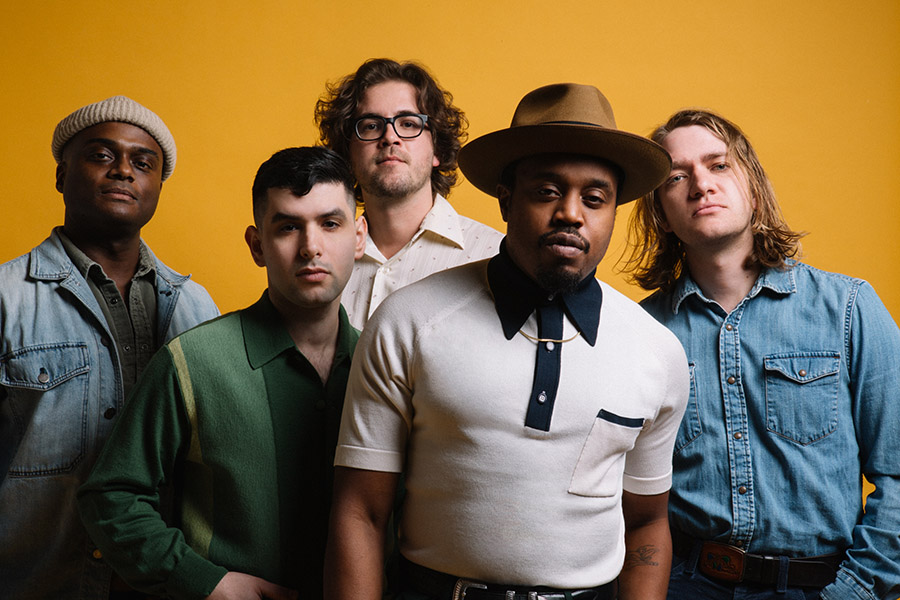
AARON: And I know we spent a couple of minutes talking about this like, outside songwriters, but I do just want to reiterate that the vast majority of the songwriting is done in-house. And that’s something that we’re proud of.
HAPPY: I like it though. It sounds like it’s a socialist icon album. I think that sort of brought up all the questions that I had. Thank you so much for talking to me. Is there anything you guys want to add in or anything I haven’t touched on that you think is important?
DURAND: (laughs) I just hope that we can make it to Australia sometimes.
HAPPY: (laughs) Yeah, I mean, good luck!
DURAND: Yeah, I know.
BLAKE: We were supposed to go to Japan in April of 2020, and tack on Australia to that. But that’s TBD now.
HAPPY: Yeah, well I hope you all can make it down here as soon – and by soon, I mean in two years. Are you still sort of doing live shows out there right now, or is everything sort of battening down at the moment?
DURAND: We’re supposed to do a national tour in September, so wish us luck that we can get our stuff together and be safe.
HAPPY: Yeah, well, be safe, make good choices. Don’t get Delta!
BLAKE: For sure!
HAPPY: Otherwise, thank you so much. Be safe!
Prive Space is out now on all streaming services!
Interview by Mike Hitch
Photos by Ebru Yildiz

